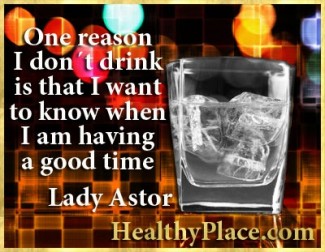Young People in Alcoholics Anonymous: It's Not Us vs. Them
I've been attending Alcoholics Anonymous (AA) for about five months and the meetings have been a blessing in my recovery. For us young people, staying sober can be very difficult because drinking seems to be the "cool" thing to do. We can often feel like our lives are "over" in early recovery, and that we are going to be missing out or boring. When I thought about attending AA, I asked myself, "how can I possibly relate to someone who is over the age of 40?" However, in the past five months my attitude has drastically changed.
 If I could give advice to young people who are hesitant about attending any substance abuse recovery meeting due to their age, I beg you to reconsider. Yes, you may get the "I wish I came in at your age" speech from an old timer, and yes, you might be the youngest person in the room. However, the great thing about AA that I have learned is that no matter the age difference, we share a common problem as well as a common solution.
If I could give advice to young people who are hesitant about attending any substance abuse recovery meeting due to their age, I beg you to reconsider. Yes, you may get the "I wish I came in at your age" speech from an old timer, and yes, you might be the youngest person in the room. However, the great thing about AA that I have learned is that no matter the age difference, we share a common problem as well as a common solution.
Young People in AA
We are a fast paced generation with information at our fingertips. Everything can be uploaded, streamed, shared, retweeted and posted in a matter of seconds. How could the older generations possibly relate to us? The trick is to keep an open mind and refrain from the "Us vs. Them" attitude, and by doing this you will be surprised at how much you can relate to. Although sometimes you may feel you're alone, there are so many young people in recovery from substance abuse. Life is definitely not over, it is simply just beginning.
The Mental Health for a Digital Generation blog is aimed at young adults facing mental health issues.
You can find Samantha U'Ren on Google+, Twitter, and Facebook.
APA Reference
U'Ren, S.
(2014, April 10). Young People in Alcoholics Anonymous: It's Not Us vs. Them, HealthyPlace. Retrieved
on 2025, December 24 from https://www.healthyplace.com/blogs/mentalhealthforthedigitalgeneration/2014/04/young-people-in-alcoholics-anonymous-it-really-isnt-us-vs-them
Author: Samantha U'Ren
Mental health care is extremely critical and we continue to lose benefits or access care
AA has changed
I have been in since I was young and now twenty plus years
My mental health issues were more trauma based from growing up in an abusive alcoholic family
I
Every time I went to the psychiatric unit
Drinking was part of the crisis
But I wanted my mental illness to be more important than alcohol just to get delicate handling from psychiatric doctors and therapist and very convincing too
Until I was clean enough to get a baseline without substance
Things would be more clear
I understand both sides
Often dual recovery still puts the mental health first and very little evidence that the flip side of addiction is covered
Bringing that part in is optional
I work in a dual recovery residential center
I n aa older folk didn’t understand as much
Not my sponsors
But they knew how to listen care and love and can become steady healing role model’s
I’m here
I totally understand both sides personally
There’s lots of us here with open hands
I didn’t pick someone to sponsor me that was a peer or around my age
But someone steady seasoned wise and evidence based to guide me
My dad died at 30 from the disease
It’s not religious
To me AA is not religious it’s spiritual
Higher is anything or anyone who is not me and my self or body
As parent and professor of digit generation I can say that there are many misconception on real life events between my age companions and youthfulness. The reasons for these discrepancies are numerous, but digital era with its rapid and incredible achievements has got primary place and role, as well. However, these distinctions should be in function of mutually co-operation, in order to co-ordinate one's own needs and ambitions. I think, that both generations are in need of reciprocal psycho-social help. On the one side old people may to give useful life advices to young ones, while digital generation can help the old generation on fantastic benefits of digital information technology. But wisdom of oldish people is irreplaceable in correct education of young generation. The same is value in appropriate psychiatric therapy of patient with alcoholic abuse in Alcoholic Anonymous groups, as is your excellent experience. As to belong to group therapy, it ought to mention the great positive effect of group on recovery not only to patient with alcoholic and drug abuse.